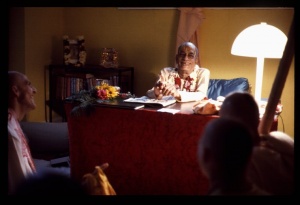SB 1.17.21: Difference between revisions
m (1 revision(s)) |
No edit summary |
||
| Line 1: | Line 1: | ||
{{info | {{info | ||
|speaker= | |speaker=Sūta Gosvāmī | ||
|listener=Sages of | |listener=Sages of Naimiṣāraṇya | ||
}} | }} | ||
[[Category:Srimad-Bhagavatam - Canto 01 Chapter 17]] | |||
[[Category:Bhagavatam Verses Spoken by Suta Gosvami - Vanisource|011721]] | |||
<div style="float:left">'''[[Srimad-Bhagavatam]] - [[SB 1|First Canto]] - [[SB 1.17: Punishment and Reward of Kali|Chapter 17: Punishment and Reward of Kali]]'''</div> | |||
<div style="float:right">[[File:Go-previous.png|link=SB 1.17.20]] '''[[SB 1.17.20]] - [[SB 1.17.22]]''' [[File:Go-next.png|link=SB 1.17.22]]</div> | |||
{{CompareVersions|SB|1.17.21|SB 1965|SB 1972-77}} | |||
{{RandomImage}} | |||
==== TEXT 21 ==== | ==== TEXT 21 ==== | ||
<div class="verse"> | |||
<div | :sūta uvāca | ||
sūta uvāca | :evaṁ dharme pravadati | ||
evaṁ dharme pravadati | :sa samrāḍ dvija-sattamāḥ | ||
sa samrāḍ dvija-sattamāḥ | :samāhitena manasā | ||
samāhitena manasā | :vikhedaḥ paryacaṣṭa tam | ||
vikhedaḥ paryacaṣṭa tam | |||
</div> | </div> | ||
| Line 19: | Line 24: | ||
==== SYNONYMS ==== | ==== SYNONYMS ==== | ||
<div class="synonyms"> | |||
<div | ''sūtaḥ uvāca''—Sūta Gosvāmī said; ''evam''—so; ''dharme''—the personality of religion; ''pravadati''—thus having spoken; ''saḥ''—he; ''samrāṭ''—the Emperor; ''dvija-sattamāḥ''—O best among the ''brāhmaṇas''; ''samāhitena''—with proper attention; ''manasā''—by the mind; ''vikhedaḥ''—without any mistake; ''paryacaṣṭa''—counterreplied; ''tam''—unto him. | ||
sūtaḥ | |||
</div> | </div> | ||
| Line 27: | Line 31: | ||
==== TRANSLATION ==== | ==== TRANSLATION ==== | ||
<div class="translation"> | |||
<div | |||
Sūta Gosvāmī said: O best among the brāhmaṇas, the Emperor Parīkṣit, thus hearing the personality of religion speak, was fully satisfied, and without mistake or regret he gave his reply. | Sūta Gosvāmī said: O best among the brāhmaṇas, the Emperor Parīkṣit, thus hearing the personality of religion speak, was fully satisfied, and without mistake or regret he gave his reply. | ||
</div> | </div> | ||
| Line 35: | Line 38: | ||
==== PURPORT ==== | ==== PURPORT ==== | ||
<div class="purport"> | |||
<div | |||
The statement of the bull, the personality of religion, was full of philosophy and knowledge, and the King was satisfied, since he could understand that the suffering bull was not an ordinary one. Unless one is perfectly conversant with the law of the Supreme Lord, one cannot speak such things touching philosophical truths. The Emperor, being also on an equal level of sagacity, replied to the point, without doubts or mistakes. | The statement of the bull, the personality of religion, was full of philosophy and knowledge, and the King was satisfied, since he could understand that the suffering bull was not an ordinary one. Unless one is perfectly conversant with the law of the Supreme Lord, one cannot speak such things touching philosophical truths. The Emperor, being also on an equal level of sagacity, replied to the point, without doubts or mistakes. | ||
</div> | </div> | ||
__NOTOC__ | |||
<div style="float:right; clear:both;">[[File:Go-previous.png|link=SB 1.17.20]] '''[[SB 1.17.20]] - [[SB 1.17.22]]''' [[File:Go-next.png|link=SB 1.17.22]]</div> | |||
__NOTOC__ | |||
__NOEDITSECTION__ | |||
Revision as of 12:09, 2 May 2021

A.C. Bhaktivedanta Swami Prabhupada
TEXT 21
- sūta uvāca
- evaṁ dharme pravadati
- sa samrāḍ dvija-sattamāḥ
- samāhitena manasā
- vikhedaḥ paryacaṣṭa tam
SYNONYMS
sūtaḥ uvāca—Sūta Gosvāmī said; evam—so; dharme—the personality of religion; pravadati—thus having spoken; saḥ—he; samrāṭ—the Emperor; dvija-sattamāḥ—O best among the brāhmaṇas; samāhitena—with proper attention; manasā—by the mind; vikhedaḥ—without any mistake; paryacaṣṭa—counterreplied; tam—unto him.
TRANSLATION
Sūta Gosvāmī said: O best among the brāhmaṇas, the Emperor Parīkṣit, thus hearing the personality of religion speak, was fully satisfied, and without mistake or regret he gave his reply.
PURPORT
The statement of the bull, the personality of religion, was full of philosophy and knowledge, and the King was satisfied, since he could understand that the suffering bull was not an ordinary one. Unless one is perfectly conversant with the law of the Supreme Lord, one cannot speak such things touching philosophical truths. The Emperor, being also on an equal level of sagacity, replied to the point, without doubts or mistakes.